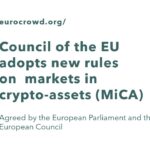News
EU discussions on harmonised Insolvency Law: A balancing act of incentivising investors and serving small- and micro-enterprises

Ongoing EU discussions regarding further harmonisation of the Capital Market Union are taking shape and will likely help crowdfunding under ECSPR with cross border activities. Discussions regarding the harmonisation of Insolvency Law are currently being held at the European Parliament's Committee on Economic and Monetary Affairs (ECON) on a draft proposal for a directive on the harmonization of aspects of insolvency provides. For crowdfunding under ECSPR a simplification of Insolvency Laws and a relevant fast and cost-effective procedure for SME and micro-enterprise would be highly welcome.
The ECON clarified in its last discussion that they see the insolvency directive as part of a package to improve the capital market union (CMU) – and is therefore signifying the importance of bankruptcy law for the CMU. Differences in bankruptcy law among member states remain a deterrent for foreign and cross-border investment. And where the European Commission's proposal introduces protection measures for SMEs, the ECON does not propose an extraordinary revision of the Commission's proposal and supports the overall indicated path, emphasizing legal and procedural certainty, as well as cost containment for businesses.
It is important that the liquidation and protection of SMEs will be addressed in the new law, and while the current proposals seek to create adequate solutions, for example within the ECDON by providing for an "insolvency practitioner" into the small business context, the cost would likely make this unworkable. EUROCROWD supports the overall approach but suggest to further simplify aspects for SME and micro-enterprises.
The Directorate General for Financial Stability, Financial Services and Capital Markets Union (DG FISMA) is however arguing that the goal of the CMU's is access to capital. Regarding insolvency, this means that an investor would need to know how much she can recover in the worst-case scenario. As a result, it would be necessary to strengthen the certainty of procedures in the most cost-effective manner, because otherwise SMEs may not be able to access an orderly liquidation and investors may not be able to recover their investment. Any use of an insolvency administrator must also be applicable and fundable for micro-enterprises DG FISMA argues. Especially for crowdfunding service providers and their retail investment clients, it will be important that the changes to Insolvency Law are effectively taking this into account.
While the drafting of proposals continues, the deadline for amendments is the 7th of September 2023, and the vote in the ECON Committee is for now scheduled for the 28th of November 2023. After that, the opinion will be forwarded to the JURI Committee, which is scheduled to vote on the file on the 12th of February 2024.

